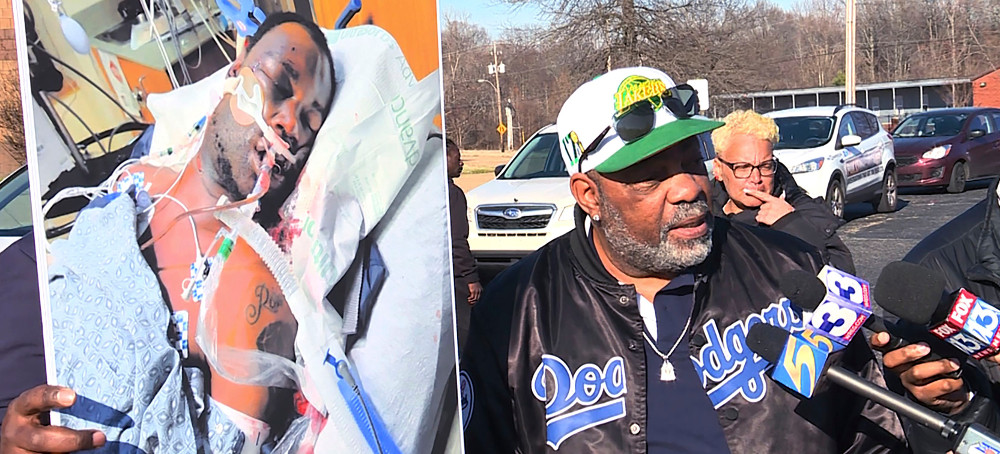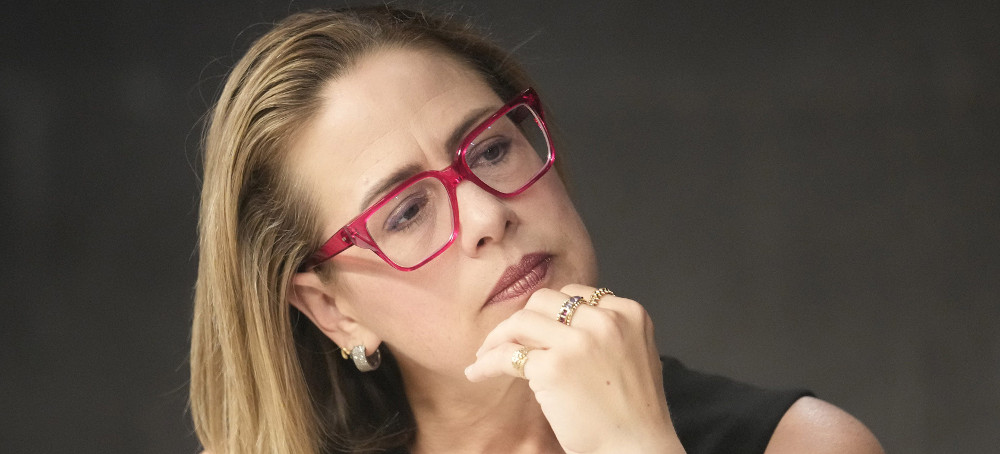Live on the homepage now!
Reader Supported News
Ruben Gallego’s rollout was strong. And a credible Democratic candidate means Sinema’s path to reelection is awfully narrow.
That was just a few days ago, and since then Sinema’s prospects have only gotten more dubious. Congressman Greg Stanton, another Arizona Democrat eyeing the race, announced that he would not run for Senate, making a chaotic Democratic primary a little less likely. On Monday, Michigan Senator Gary Peters, the returning chairman of Senate Democrats’ campaign arm, declined to vow to protect Sinema, a signal that even though the newly independent Arizona senator is still caucusing with Democrats, she may not enjoy the protections a senator who stuck with Democrats could count on come reelection time.
All of which is to say that Sinema’s route to reelection has already narrowed. It’s not clear how much support she has among her Capitol Hill colleagues. All but two senators interviewed by Punchbowl News declined to give a straight answer on whether they would support her in 2024. Only Manchin and Senator John Hickenlooper of Colorado indicated they’d back her. Manchin is ideologically very close to Sinema, and Democratic aides I talked to about Hickenlooper say his possible support was more characteristic of how he likes to operate in response to such questions rather than an ironclad commitment. Senator Mark Kelly, the other Arizona senator, has refrained from weighing in directly, saying only that Arizona voters “need a little rest from, you know, Senate races.”
It was never going to be a cakewalk. Sinema’s departure from the Democratic Party has not helped her reelection bid. Quite the opposite, in fact. On Tuesday, Gallego’s still new Senate campaign announced it had raised $1 million from over 27,000 donors, topping Kelly’s record over the same period of time, according to a press release from the congressman’s campaign.
“She can’t run from her record. She’s abandoned her base, and her base knows it. She was just in Davos, Switzerland, rather than talking to folks in her home state,” said Democratic strategist Julian Mulvey, who is advising an anti-Sinema independent expenditure group. “And now you have a very credible candidate in Gallego, with a compelling personal story, who’s connected to Democratic primary voters and has a better record and vision for the state.”
Daniel Scarpinato, a Republican strategist, argued that Sinema’s notoriety among Democrats and lack of familiarity among Republicans makes her path difficult. “I really do think she’s hated on the Democratic side, and so I actually think he’s going to do a pretty good job consolidating the Democratic base,” Scarpinato said. “I also think a lot of Republican voters don’t know that much about her other than she’s been a problem. I don’t think they know all her positions. I don’t think they know she’s an atheist. I don’t think they know the degree to which she’s progressive on several issues.”
On the surface, Arizona looks like the kind of state where an independent senator could arguably break through. The most recent voter registration numbers show a rough 30–30–30 split among registered Republicans, Democrats, and independents
“A lot of people would say, generally, ‘Oh, it’s a third–a third–a third. There’s a lot of independents in that state. That may be on paper, but the reality is that most independents either always or generally vote Democrat or Republican. There’s very few people that are actually truly independent,” said Republican strategist Steven Peutz. “The percentage of voters that are truly in the middle, that are true swing voters that would like that profile of an independent, are a pretty small percentage of the electorate.”
It’s “hard to see a real pathway to Sinema getting reelected. She was going to lose the Democratic primary, but there is no path as an independent—especially with her low favorability and no base. Gallego is a strong candidate,” said D.J. Quinlan, a former Arizona Democratic Party chairman.
For Republicans, meanwhile, the argument is that as long as the eventual nominee is not an overly conservative one who turns off the broader electorate, they have a shot. Republicans pointed to Kari Lake’s gubernatorial run and how, despite her late surge in the polls, she lost to Democrat Katie Hobbs. Similarly, at the beginning of the cycle it looked like Kelly was in serious danger of losing reelection to Republican Blake Masters. Kelly ended up winning by over 125,000 votes. “There’s a majority of voters that will vote for a Republican if they are the right Republican running the right race,” Peutz said. “Experience matters, your background matters, what you said and did prior to running for office matters.”
Names bandied about in the GOP primary include Lake, Masters, and Republican Karrin Taylor Robson, all candidates who have run statewide before but failed, as well as former Arizona Governor Doug Ducey. The list, in other words, isn’t short.
Among the Republicans in Arizona I talked to, there’s a sort of bruised caution in the air. The midterms were supposed to produce a Republican governor and Republican senator in Arizona. Instead, now Democrats hold those two seats. If the GOP primary is going to be as big as it looks right now, that could augur a repeat for Republicans.
“I think we’ll have a prolonged primary. That’s what Republicans do,” Scarpinato said.
That too does not necessarily bode well for Sinema. She needs a settled primary that produces an extreme nominee who will drive the moderate, McCain-style Republicans away from their candidate. Recent developments suggest the opposite is likely to happen.
Sinema’s path has always depended on both Republicans and Democrats nominating candidates centrists find unbearable. That’s not quite what happened. Gallego, a liberal, is indeed running, but he’s hardly an extremist. And on the Republican side, Sinema’s record has plenty that your average base Arizona conservative Republican voter may not like. It’s an increasingly complicated situation by any measure.
READ MORE  Tyre Nichols's stepfather, Rodney Wells, right, holds a photo of Nichols in the hospital after his arrest, during a protest in Memphis, Jan. 14. (photo: Jordan James/AP)
Tyre Nichols's stepfather, Rodney Wells, right, holds a photo of Nichols in the hospital after his arrest, during a protest in Memphis, Jan. 14. (photo: Jordan James/AP)
In a video statement released Wednesday evening, Police Director Cerelyn “C.J.” Davis described the beating that Nichols received during the arrest as “heinous, reckless and inhumane.”
“This is not just a professional failing. This is a failing of basic humanity toward another individual. They failed our community, and they failed the Nichols family. That is beyond regrettable,” Davis said.
Last week, the five officers involved in the Jan. 7 arrest, all of whom are Black, were terminated. The department named the officers as Tadarrius Bean, Demetrius Haley, Emmitt Martin III, Desmond Mills Jr. and Justin Smith.
On Monday, Nichols’s family held a press conference alongside civil rights attorney Ben Crump and their legal team after seeing the video footage for the first time.
“All my son was trying to do was get home. He was two minutes from the house when they stopped him. He was less than 80 yards away when they murdered him,” Nichols’s mother said.
Crump described the video as “appalling. It is deplorable, it is heinous, violent, and it is very troublesome on every level.”
“Regrettably it reminded us of the Rodney King video, and unlike Rodney King, Tyre did not survive,” Crump added.
Crump’s co-counsel described Nichols as defenseless in the video. “He was a piñata to those police officers, it was an unadulterated, unabashed nonstop beating of this young boy for three minutes,” lawyer Antonio Romanucci said during the press conference.
The police chief said the video will be released “in the coming days” and urged the community not to respond with violence and destruction. It was not immediately clear when the body camera footage would be released, but Crump on Monday said it could be one to two weeks.
“I expect you to feel what the Nichols family feels. I expect you to feel outraged by the disregard for basic human rights as our police officers have taken an oath to do the opposite of what transpired on the video,” Davis said.
“I expect our citizens to exercise their First Amendment right to protest, to demand action and results. But we need to ensure our community is safe in this process,” she added.
While the five officers involved in Nichols’s death were terminated, his family says that is not enough — they want first-degree murder charges.
As the investigation continues, the Memphis Police Department says it is committed to transparency and rebuilding trust in the community. “This is not a reflection of the good work that many Memphis police officers do every day,” Davis said. “I am not wavering in my commitment to you to have a police force that is here to serve and protect you.”
Shelby County District Attorney Steve Mulroy is expected to announce an update on the investigation at 3 p.m. ET Thursday.
“My heart went out to the family,” Mulroy told the Associated Press. “I’m a parent ... I can’t imagine anything worse than losing a child, with the possible exception of losing a child under really violent, prolonged circumstances.”
As the city awaits the release of the bodycam footage, the Tennessee Bureau of Investigation is probing the incident, while Nichols’s mother is preparing to bury her youngest son.
On Monday, the family’s legal team completed an independent autopsy on Nichols. “Preliminary findings indicate Tyre suffered extensive bleeding caused by a severe beating,” Crump said of the autopsy.
The Rev. Al Sharpton said he will deliver the eulogy at Nichols’s funeral and will stand by the family along with civil rights advocates to ensure they receive justice.
“Firing these officers for misconduct is not enough,” Sharpton said in a statement. “Justice will only be served when all five are charged with killing Tyre Nichols for the simple act of driving while Black.”
Follow us on facebook and twitter!
PO Box 2043 / Citrus Heights, CA 95611


No comments:
Post a Comment
Note: Only a member of this blog may post a comment.